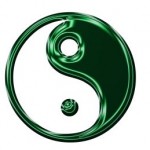The concept of piercing the veil of illusion comes primarily from Hinduism. The word the Hindus use to refer to what they call the illusion of duality is “maya.’
The word “maya” is derived from Sanskrit roots. “Ma” means “not” and “ya” means “that.” In short, when the student asks whether something is True, the teacher will reply “Maya”, not that.
Why does the teacher always say “Maya”, no matter what words the student has spoken? Because words – all words – are illusions!
The goal of enlightenment is to understand this illusion – or more precisely, to experience or pierce it. Maya is something to be seen through, like an epiphany or aha experience. When we have this aha experience, we have the power to end our suffering.
Piercing the veil of word illusions can be analogized to tuning the dial of a radio. At some points, there is nothing but static. At others, the signal comes through clear as a bell.
When we eliminate the static of human words and tune the dials of our minds into an energy that lies beyond words, everything flows effortlessly and spontaneously through us. We are transformed.



November 20th, 2011 at 5:29 pm
After reading your blog entry, “Piercing the Veil of Word Illusions” I was reminded of one of the topics I studied in yoga, the power of letters or the “Matrika Shakti.” In A Concise Dictionary of Indian Philosophy by scholar John Grimes, “Matrika” is a “letter or sound syllable which is the basis of all words and hence of all knowledge; ‘little mothers’ 1.The Mother Goddess or Sakti in the form of sound, which generates the universe. The inherent power of letters and words. Because it is the source of words, matrika is said to be the source of ignorance (which comes about mainly through the ideas produced by words).” These “little mothers” or “shaktis” are one definition of the fifty phonemes of the Sanskrit alphabet which create and transform the universe, or matrika can also be known as the “‘uncomprehended mother,’ an allusion to our failure to understand the power matrika has in our lives–the way we get lost in the meanings of the words we hear, both from others and from inside ourselves,” as stated by Swami Shantananda in his book, The Splendor of Recognition: An Exploration of the Pratyabhijna-hrdayam, a Text on the Ancient Science of the Soul.
I would like to add that the illusory power of words ties in with what are known as the “kleshas,” or the afflictions which tie us down to the reincarnational cycle of birth, death, rebirth and reincarnation. Again, from John Grimes dictionary, “Klesa” is defined as “1. The afflictions of the body, mind. and speech. 2. Afflictions are of five types: ignorance (avidya), egoism (asmita), attachment (raga), aversion (dvesa), and the will to live (abhinivesa).” (As per the latter, here the “will to live” as an affliction simply implies the fear of death or dire attachment to life.) The “Matrika Shakti” relates to the kleshas of attachment and aversion, in that the illusory power of words as quoted above, have the ability to sway us in uplifting terms (attachment to praise or the pleasant) and to depress us in derogatory terms (aversion to criticism or the unpleasant), all of which can lead lead to egoism and finally to ignorance and fear of death.
So words apparently keep us in their clutch. Are we to become attached only to their good qualities and avoid the discomfort they can also cause when people say things, for example, to press our buttons? Becoming attached to something can only lead to its opposite attacking us; so we solve this with dispassion and attentive detachment to the reactions that words arouse in us, a skill garnered through the process of meditation.
Lastly, if words have such illusory power over us as products of maya, the force of illusion, which derives its power from God, as without maya we cannot overcome illusion in and of itself, then words in their sacred form as mantra have the power to liberate us. The word “mantra” comes from the root “man” or mind and “tra” to save or protect so that mantra is “that which saves the one who reflects.” Mantras are not ordinary words derived from man, but are inspired by God, and received by the rishis or adepts of ancient times in deep states of meditation, where any sense of egoity has been transmuted by the higher mind as a conduit to the Consciousness known as God. Mantras can thus liberate the speaker from the kleshas by repeating them out loud in a heartfelt manner or silently in meditation with the in and out breath, often resulting in experiences of a peaceful and spiritual nature.
Thus, from matrika we derive mantra, within which is hidden the source of salvation which can liberate us from reincarnating on the wheel of life and death, ending this journey into the veil of tears we know as life on earth. Terence McKenna, a most eloquent psycho-activist who knew the value of words, once asked if we were really meant to be light beings and that due to some horrid cosmic error, got stuck in this reincarnational wheel. We will never know, but knowing more about maya, matrika and mantra can help make the vicissitudes of this mystery more bearable.
January 1st, 2012 at 12:39 am
Yes it’s well written but this derivers from Sankara school. I dso not accept
this neo-Gnostic position. As you know I think Sri Aurobindoi’s perspective is more inspiring. You writre”I would like to add that the illusory power of words ties in with what are known as the “kleshas,” or the afflictions which tie us down to the reincarnational cycle of birth, death, rebirth and reincarnation. ” From Aurobindo’s perspectivr the goal is NOT to escape incarnation but to bring down the spirit upon earth. This will enable us to attainb immortal bodies thus freeing usa from the necessity of the “eternal cycle.” But iut will not free us from invcarnation. We are meant to be here–but to treat the world with reverence. Seth F
January 27th, 2013 at 9:06 pm
[…] So here is the address from Janet’s blog, whose content with my input I am posting here (https://janetsmithwarfield.com/words/piercing-the-veil-of-word-illusions/): […]